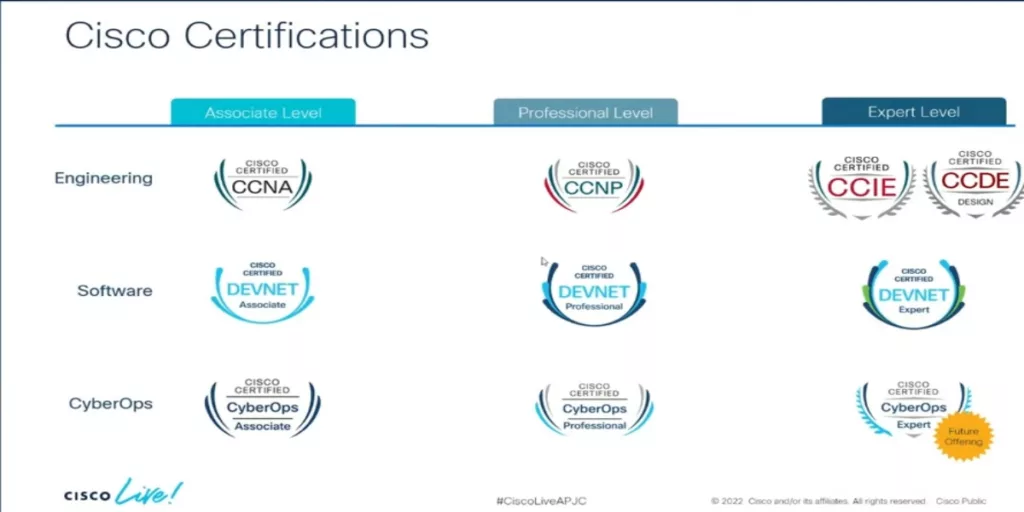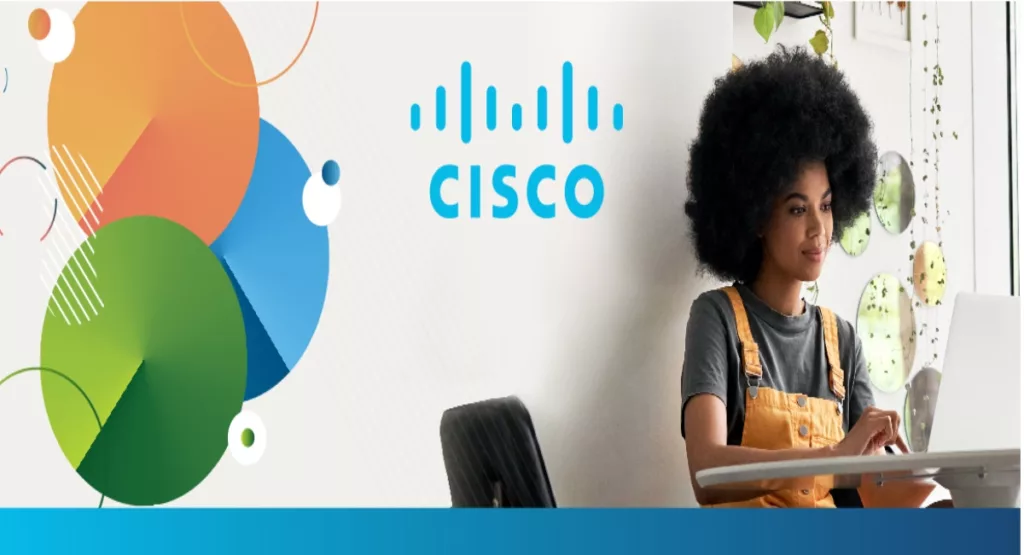Introduction
Cisco’s Certifications are a great way to kick-start a career in Information technology. Cisco is one of the most recognizable brands in the industry. If you are just starting out in IT, it may be a good idea to start without an entry-level certification that will provide you with valuable insights into the industry as well as skills to help you get your first job. This blog will be a guide to help you navigate the different entry-level certifications that are available within Cisco’s course offerings. It will explore the major entry-level certifications from Cisco and what you need to know about each.
Why Cisco’s certification? well for several reasons; As a beginner, you will find Cisco certifications are very robust and are widely regarded by Human resource managers. They are the leading vendor for the provision of enterprise networking infrastructure. Cisco’s certifications are globally recognizable and they have a large community to help you in learning the technology. We shall explore the certifications that you may want to consider as a beginner.
Importance Of Entry-Level Certifications
Certifications in general validate what you know, they tell a prospective employer that you are knowledgeable in certain skill sets. As a beginner, you are without any experience in the industry, Entry-levels lay the foundation for which you can build your practical knowledge. Whether you are fresh out of college or you want to make a transition into IT from other fields, entry-level certs will provide you with the following benefits;
- Skill Validation – Entry-level Certification validates your skills, it tells a prospective employer that you are skilled in certain areas.
- Learn Opportunity – They avail you the opportunity to learn a technology, especially at the foundational level. – You get to learn the foundational concepts of a particular IT niche. They give you a broad overview of your career niche.
- Employment Opportunities – Many Hiring managers will often require them to employ you. It increases your value to an employer. It shows you have the discipline to commit to a learning routine. You are also likely to earn more with them than without.
- Easier Career Transition – Entry-level certifications make your transition to IT much easier, you learn the foundational concepts. It acts as a bridge to much more complex concepts in tech.
- Networking Opportunities – It offers you the opportunity to meet professionals in the industry, get mentorship, and build your professional network.
Target Audience And Prerequisites
These Cisco certifications are for persons who want to start a career in IT. There are no prerequisites, no prior knowledge or education. People even without a college degree can still start a career in IT with these entry-level certifications. All that is required is the commitment to a study routine and a willingness to learn. These certs are also ideal if you want to transition from a non-technical career to information technology.
Understanding Cisco’s Certification Levels

Cisco Certifications are in three broad workstreams or Job roles, These are Engineering, Software (or DEVNET), and CyberOps. Each of these is further divided into smaller roles and there is room for collaboration and specialized certifications. There are different levels of expertise for many of these certifications. These include the entry levels, Associate Levels (to which the popular CCNA belongs), Professional levels, and Expert levels.
Cisco’s Entry-level certifications are for people who want to begin a career in IT. They will typically focus on foundational concepts and are limited to a few areas. They are enough for you to start a career and then further develop your expertise as you progress to other higher Certs like the Associate or Professional level.
The three main Entry-Level Certifications from Cisco are as follows;
- Cisco Certified Support Technician (CCST) – Networking
- Cisco Certified Support Technician (CCST) – Cybersecurity
- Cisco Certified Technician (CCT) with different tracks Routing and Switching, Collaboration, Data Center
1. Cisco Certified Support Technician (CCST) – Networking
The Cisco Certified Support Technician (CCST) Networking is the entry-level certification from Cisco. It is for persons who are absolute beginners in IT and want to pursue a career in networking. It was released on April 21, 2023, as the first introduction to foundational networking concepts.
The Certification teaches and validates knowledge of entry-level concepts and topics. It demonstrates foundational skills that are needed to show how networks operate. The CCST will also provide the basic knowledge and training required for candidates to progress to CCNA (The CCNA covers many of the same topics in the CCST in greater depth). It is however not a prerequisite for taking the CCNA.
The CCST has lifetime validity, no recertification is needed.
Exam details and requirements
The CCST Networking is a 50-minute exam. The number of questions in the exam varies (depending on which questions Cisco decides to serve from their exam bank) but typically between 35-50 questions. There are no prerequisites for the exam. The Exam cost is $125 making it to be among the cheapest exams from Cisco (the Associated level exams are $300). There are 6 sections in the CCST Networking Certification exam, these are ;
- Standards and Concepts
- Addressing and Subnets
- Endpoints and Media Types
- Infrastructure
- Diagnosing Problems
- Security
The breakdown of each of these is in the Exam Guide
Benefits Of The CCST Networking And Career Opportunities
- It is ideal for entry-level jobs such as network technicians, IT or customer support, Junior networking roles, etc.
- It prepares you to take the higher-level CCNA exam
- It is cheaper and easier to pass than the CCNA.
- It is a great resume builder especially if you are just starting out in IT.
- No need for renewal or recertification as it has a lifelong validity
2. Cisco Certified Support Technician (CCST) Cybersecurity
The Cisco Certified Support Technician (CCST) Cybersecurity certification is an entry-level certification for beginners in Cybersecurity. It validates skills and knowledge of entry-level cybersecurity concepts and topics. Foundational topics for both Network Security and Endpoint Security, Security principles, Vulnerability Assessments, Risk management, Cybersecurity principles, etc. It is one of the new entry-level certifications released in March 2023.
The Cisco Certified Support Technician (CCST) Cybersecurity certification also lays the foundations for higher certifications such as the CyberOps Associate certification. It is ideal for entry-level jobs in security-related disciplines as a Junior Cybersecurity Analyst, Security technician, IT support, etc.
Exam Details and Requirements
The CCST Cybersecurity exam is a 50-minute exam with 40-50 questions. The exam cost 125$. The pass mark is also 700/1000 like the CCST Networking. There are no prerequisites. The CCST Cybersecurity exam is divided into 5 sections; these are ;
- Essential Security Principles
- Basic Network Security Concepts
- Endpoint Security Concepts
- Vulnerability Assessment and Risk Management
- Incident Handing
The details of each of these sections are in the Exam Guide
Benefits Of The CCST Cybersecurity And Career Opportunities
- It is ideal for entry-level Cybersecurity positions such as a Help Desk Support role, Cybersecurity technician, or Cybersecurity Analyst.
- It lays the foundations for learning cybersecurity which is in high demand in the job market.
- It is a stepping stone to taking the CyberOps certification
- It is cheaper than CyberOps and easier to pass
- It has no expiration and it is a great resume-builder
3. Cisco Certified Technician (CCT)

The Cisco Certified Technician is the entry-level certification with a focus on Cisco networking devices and environments etc. The goal of the certification is to provide you with skills to diagnose, repair, restore, and replace critical networking devices and system devices for customers. It is a certification for a technician role.
A Cisco Technician is the guy you call on to fix basic problems with your networking devices. They will need to visit the customer site to diagnose and fix problems with networking devices. The CCT certification will provide you with the skill to work with other team members (e.g.Network Engineer or Architect) in a supporting role.
The Cisco Certified Technician (CCT) certification usually will focus on a limited niche of Cisco devices or specific technologies. There are no prerequisites for the CCT and it is not also reserved as the foundation for higher certifications. There are different tracks to the CCT certification depending on the technology or system of Cisco products they focus on. These include
- CCT Routing and Switching Certification
- CCT Collaboration Certification
- CCT Data Center Certification
i. Cisco Certified Technician (CCT) Routing and Switching
This is designed to train people on skills required for onsite support and maintenance of Cisco routers and Switches. It is at the core of basic networking essentials as it relates to Routing and Switching. The certification exam is 100-490 RSTECH and will General Networking knowledge (25%), Cisco Equipment and Related Hardware(20%), Cisco IOS Software Operations (29%), and Service-related knowledge (26%).
A Copy of the exam guide is available here
ii. Cisco Certified Technician (CCT) Collaboration
This is an entry-level certification to teach you collaboration technologies (phones, call manager, unity for voice calls, presence, etc) within the Cisco ecosystem. The focus is on the skills required for onsite support and maintenance of Cisco collaboration endpoints. The certification and exam are divided into these core parts; Collaboration environment (35%), Cisco Collaboration Endpoints, and Equipment hardware (20%), and Service Knowledge (45%).
The Exam code is 100-890 CLTECH. The Exam Topics Guide for the Cisco Certified Technician Collaboration certification is available here
iii. Cisco Certified Technician (CCT) Data Center
This entry-level certification is for those people who desire to work with data centers (On-prem and in the cloud) technologies. There is a huge focus on high-end Cisco data center hardware such as Nexus Switches, Multilayer Directory Switches, Cisco Unified Computing System (UCS), Servers, etc. Also various data operating systems such as Cisco NX-OS, Cisco UCS, MDS OS. The maintenance and support of these systems including cabling, accessories, and interfaces.
The Exam code for the CCT Data Center is DCTECH 010-151. It is divided into 4 sections; Data Center basics (17%), Cisco equipment and related hardware (25%), Cisco UCS and Cisco NX-OS software operation(25%), and Service-related knowledge (33%). The Exam topics guide is available here
(The Cisco devices are high-end and you are unlikely to get real equipment to do hands-on practice. You will need to get the emulators such as the Cisco UCS platform emulator)
Exam details and requirements
The Cisco Certified Technician exam costs $125 and is accessible through Pearson Vue. There are 65-75 exam questions for the CCT Routing and Switching (100-490 RSTECH) and the CCT Data Center (DCTECH 010-151). There is no official release on the number of questions for the CCT Collaboration exam (100-890 CLTECH) but, likely, it is also in the range of 65-75 questions. The duration for each exam is 90 minutes. There are no prerequisite requirements for the exam as they are entry-level certifications.
The passing scores for the exam vary but typically will be around 800/1000 with most Cisco exams. Also, not all questions carry equal scores and there even be questions that are not scored at all. Cisco does not make public these details. There are short bite Cisco authorized training materials online to help you prepare for the exam.
The Cisco CCT certifications are valid for 3 years after which you must recertify.
Career opportunities for CCT-certified professionals
The CCT certification provides you with the skills to work in many entry-level technical or supporting roles. There is a lot of demand for Data Center technicians, Network Technicians, Collaboration, etc. The average salary for a Network Technician in the US ranges from 52,000- 81,000/yr While Data Center Technicians are between 45,000 -65,000/yr (Glassdoor,2023)
How Does CCT Certs Differ From CSST Certs?
According to Cisco’s official statement, the CCT certifications (Routing and Switching, Collaboration, Data Center) are non-progressive and not a stepping stone to taking the higher associate-level certifications (CCNA and CyberOps associate) unlike the CCST certifications. The CCST certs provide you with the basic knowledge and training to progress to the associate level.
Another difference is that CCT certifications have a validity of 3 years, after which you will need to recertify for the certificate to remain valid. CCST certifications on the other hand have the validity of a lifetime i.e. They do not expire and you do not ever have to recertify them.
On the Cisco website, you will find the CCT listed under additional training material rather than as entry-level certifications (Because they are non-progressive), they are more like “specialized entry” certs.
Cisco CCT or CSST, Which One Is Right For You?
Both Certifications are entry-level certifications ideal for absolute beginners. The CCST is the latest of the two certifications and is designed to equip you with foundational knowledge, the basics, to make your transition to higher certs much easier. The CCST serves as a stepping stone to higher certs. You will find some of the topics also at the associate level. It is ideal for pursuing a more robust career in IT. It is a great addition to your resume if you are leaving college, it tells hiring managers that you already have some foundational skills in IT. You do not have to worry about recertification constantly.
The CCT is very specific to a limited Cisco environment. Not much general knowledge is provided for higher certs. It’s more like a “dead end” and no stepping stone. They do provide you with adequate skills for a lot of technician jobs. It trains you to become a technician and no further career progression. There is no emphasis on the IT infrastructure as a whole, only on how to diagnose, replace, and repair critical networking infrastructure. You also have to keep renewing the validity of the CCT certification.
Free Training Course For The CSST
Cisco offers a free training course for both CSST networking and CCST Security to help you gain knowledge and prepare for the certification exams. These are available through the online Skill For All Program and in multiple languages. The CCST Networking is a 70-hour complete course to teach you networking fundamentals accessible here. The CCST Security course duration is 120 hours and is tagged as the Junior Security Analyst Course and it is available here
Both courses are online and self-paced. Most people will complete the course in between 2-5 months (with a 1-2 hours daily study schedule ). There is a Certificate of Completion for those who do not want to sit for the certification examination.
Conclusions
Cisco’s Entry-level certifications are great certs for someone wishing to pursue a career in IT. They are globally recognized and offer some of the best training a certifications. The new entry-level certs from Cisco include the Cisco Certified Support Technician (CCST) Networking and the Cisco Certified Support Technician (CCST) Cybersecurity. They are stepping stones for higher CCNA and CyberOps respectively. And are ideal for entry-level jobs such as Help desk, IT Technician, Junior Cyber Analyst, etc.
The older entry-level certifications – The Cisco Certified Technicians (CCT)are for technician jobs specific to certain Cisco devices. The different options in CCT are CCT Collaboration, CCT Data Center And, CCT Routing and Switching. These offer different career opportunities such as Data Center technicians, Network technicians, etc. The CCT is non-progressive unlike the CCST
More Career Opportunities




